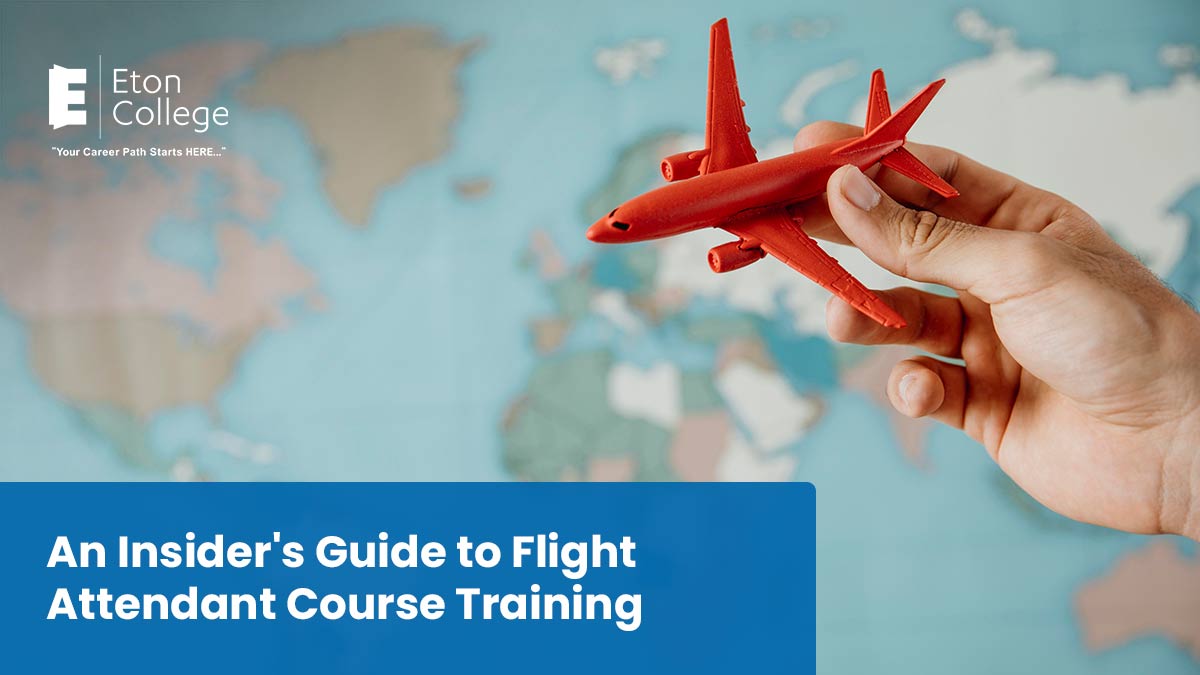- Most airlines do make pre-course work available including airport codes, the 24-hour clock, and the terminology within an airline.
- According to industry standards, flight attendants need to pass exams with 95% grades or higher.
- Flight attendant course training focuses on firefighting, first aid, CPR/AED certification, safety and emergency, and more.
- Students of Eton College experience hands-on experience through simulations and YVR Airport visits.
For many, becoming a flight attendant is as exciting as landing to different destinations themselves. The allure of experiencing new cultures, traveling across countries, and the promise of life less ordinary make it a highly coveted career. But behind all that glitz and glamor is the arduous training to prepare flight attendants for ensuring passengers’ safety and comfort under any circumstance.
While flight attendants are often recognized for their in-flight services, like serving meals, drinks, and attending passengers’ needs, their essential roles extend beyond. They are safety professionals who are highly educated and trained in various mid-air contingencies, ranging from medical incidents to evacuations.
The safety and well-being of passengers rest in their capable hands. That’s why flight attendants undergo comprehensive and demanding training. The basics of flight attendant training programs teach everything from safety protocols to emergency procedure codes, first aid, and ways of providing customer service.
The Structure of a Flight Attendant Course
Training process for aspiring flight attendants is often intense. According to industry standards, flight attendants need to pass exams with 95% grades or higher; otherwise they will be released from their programs.
Most airlines do make pre-course work available before the actual training begins. This normally consists of basic learning such as airport codes, the 24-hour clock, and the terminology within an airline. The trainees are supposed to go through the basics so that when the actual training sets in, they are already equipped and hit the ground running.
Here are some of the fundamentals of flight attendant course:
1. Aircraft Safety and Emergency Procedures
One of the important aspects in training flight attendants is the comprehension of safety procedures and emergency protocols. Training also involves safety equipment utilized in the aircraft, such as life vests, oxygen masks, and slide rafts. They are also taught how to handle various kinds of emergencies, such as decompression or emergency landing either on water or land.
Other training also includes practical drills like evacuation techniques, water landings, and fire precautions. These are all repeated so as to ensure that whatever critical event occurs can be tackled by the trainee with both swiftness and confidence.
2. First Aid and CPR Training
First aid training is one of the most important topics in flight attendant training. They can be called to perform first aid and attend to any medical emergency relating to heart attacks, fainting, or injuries. They are usually trained in cardio-pulmonary resuscitation (CPR), operating AEDs, or Automated External Defibrillators, and in managing medical situations when professional help is not immediately available.
Many programs, including Eton College’s Flight Attendant Preparation Program, prioritize first aid and CPR/AED training. Eton College incorporates 75% of the cost for students to get First Aid Certification from the Canadian Red Cross into their overall curriculum.
3. Crew Resource Management
Elements of effective communication and teamwork are very important among cabin crew members. Crew Resource Management training teaches flight attendants to work in unison with the flight deck (pilots) and other crew for smooth and safe flight operations. This would involve understanding conflict management and how to deal with disruptive passengers, as well as working together during high-stress situations.
4. Customer Service and In-Flight Hospitality
Flight attendants also play a very important role in ensuring delivery of a high level of service to the passengers. Most flight attendant training encompasses hospitality in-flight, procedures for meal service, and handling special requests of the passengers. Additionally, it will look at developing the customer service skills on empathy, patience, and problem-solving while dealing with passengers to enable their pleasant experience during the flight.
5. Security and Dangerous Goods
Flight attendants should know aviation security and the regulations connected with the transportation of dangerous goods. Security measures training empowers cabin crew to detect threats to security, handle dangerous goods in a safe way, and properly respond to security incidents.
Choosing the Right Flight Attendant Course
Your training ground is your path to a successful flight attendant career. Thus, choosing the right course is paramount. Eton College’s Flight Attendant Preparation Program is an intensive curriculum to prepare students for a rewarding aviation career. In addition to theoretical knowledge, the program focuses on practical exposure, such as visits to Vancouver International Airport and detailed training in safety procedures.
Eton College covers a big portion of the cost incurred by students for First Aid Certification from the Canadian Red Cross, which is an assurance that the graduates would be in a position to operate well in instances of medical emergencies on board.
Furthermore, students are taken through grooming and etiquette to observe high standards. The program will develop relationships within the industry for mentorship purposes, as well as obtain some networking opportunities. At the end of the program, students will be guided in career pursuits through resume writing to preparation for job interviews with the help of our career advisers.
While the journey to becoming a flight attendant can be rigorous, undergoing extensive training equips students with the vital skills to prioritize passenger safety and comfort. With proper preparation, focus, and grit, you can conquer the challenges of training and embark on a rewarding career as a flight attendant, ready to soar the skies with confidence.




